2024 Mental Health Outlook: Growing Demand for Therapy Among Gen Z & Millennials
The new year is a time for many to focus on improving themselves both physically and mentally. Discussing mental health used to be taboo, but as younger generations grow up, it’s becoming more of an open conversation, especially among Millennials and Gen Z. New survey data finds more than half of Millennials and Gen Z have gone to therapy or are currently going to therapy.
We surveyed over 1,000 Gen Z and Millennials and learned 93% are hoping to improve their mental health in 2024. It comes as more than 1 in 4 (28%) saw their mental health decline in 2023 compared to 2022.
2024 Mental Health Plans
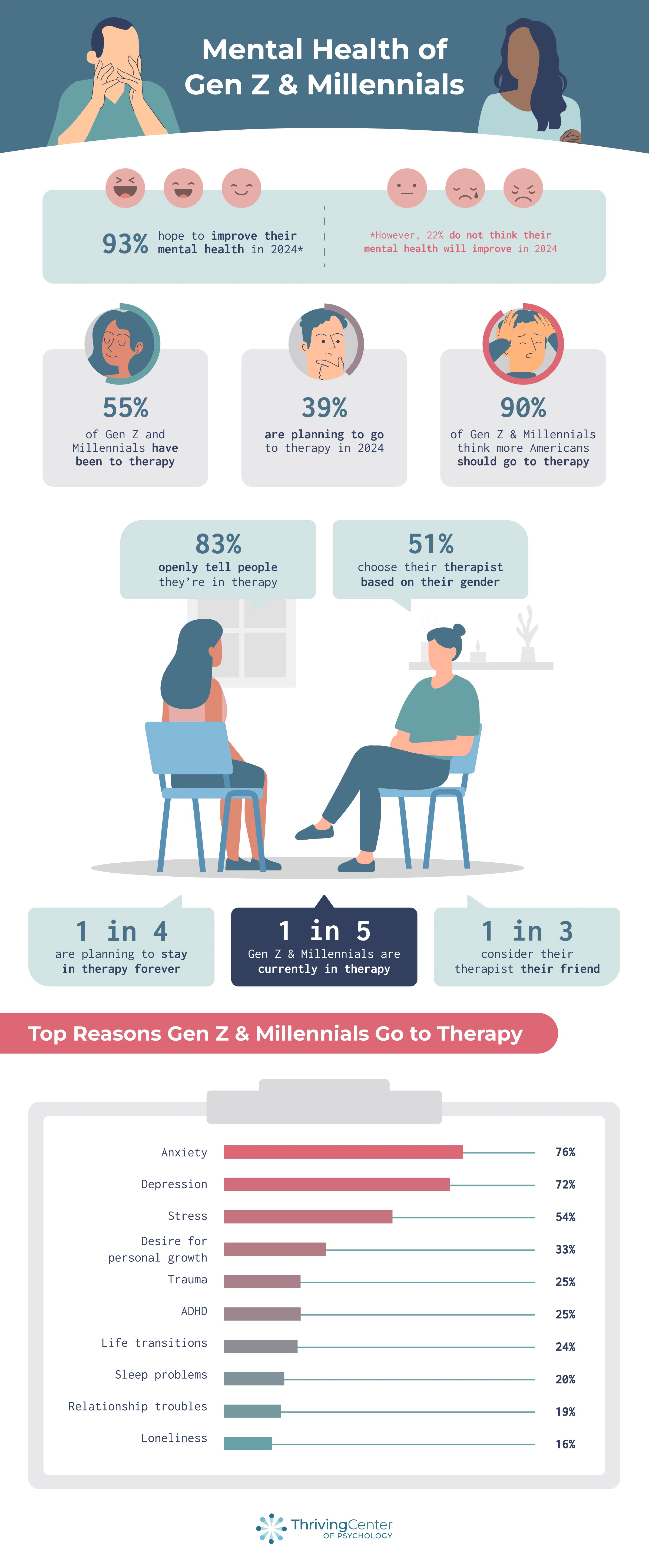
Nearly 2 in 5 (39%) Gen Z and Millennials are planning to go to therapy in 2024, and the vast majority think others should join them. 90% believe more Americans should go to therapy. Currently, 1 in 5 Gen Z and Millennials are in therapy, and 83% of those openly tell others that they are going to a therapist.
The top three reasons Gen Z and Millennials go to therapy are:
- Anxiety
- Depression
- Stress
Broken down by generation, Gen Zers mainly attend therapy for anxiety while Millennials largely go for depression. Of those currently in therapy, 26% are planning to stay in therapy forever.
Dr. Alexander Alvarado, Licensed Clinical Psychologist and CEO of Thriving Center adds,
“Millennials and Gen Z are increasingly seeking therapy to cope with unique challenges like digital era anxieties, social pressures, and global uncertainties. Their openness to discussing mental health and valuing self-care represents a progressive shift towards acknowledging and managing the complexities of modern life.”
Top Reason Millennials and Gen Z Aren’t Getting Therapy: Cost
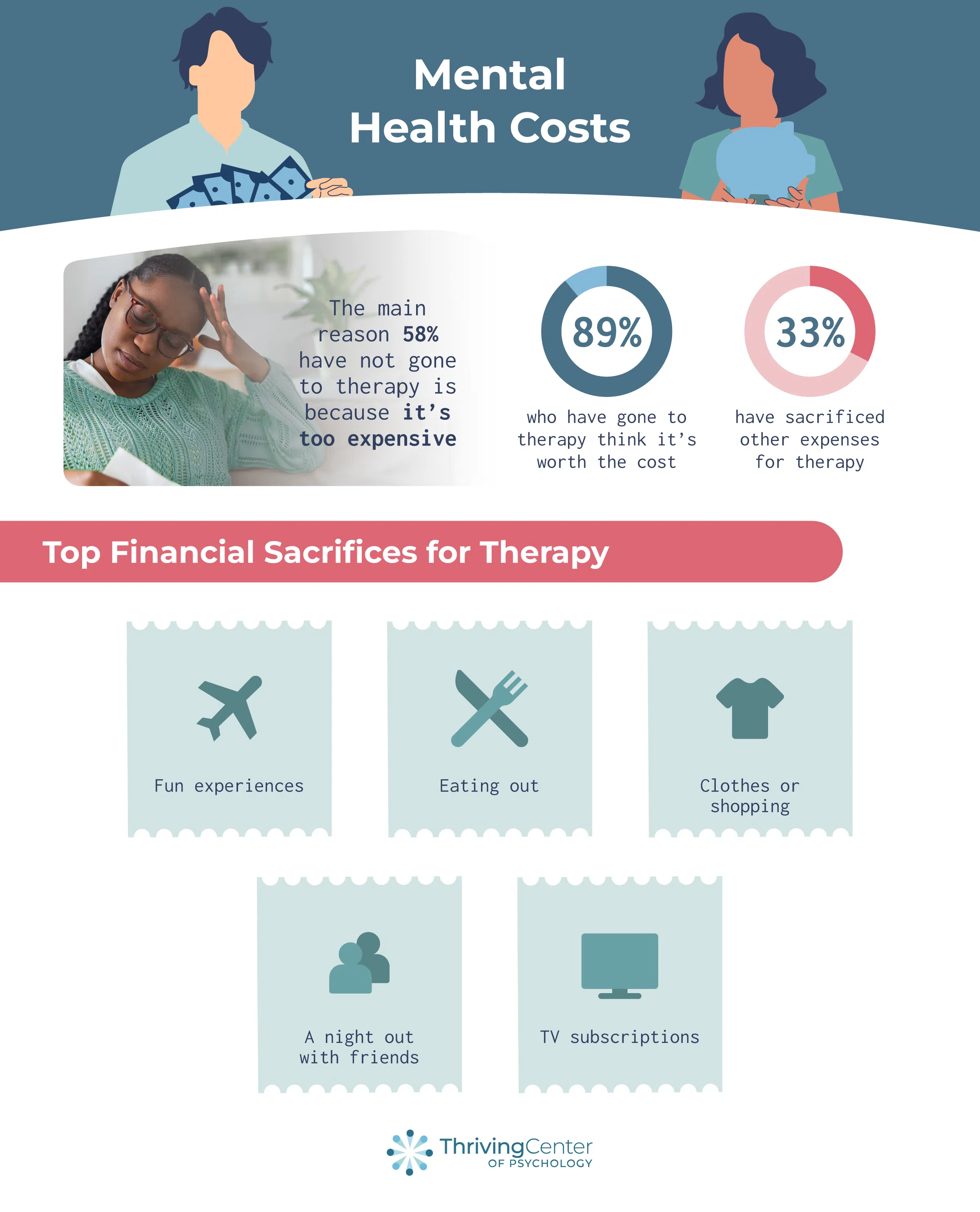
Interestingly, the top reason Millennials and Gen Z are not getting therapy isn’t because they don’t think they need it, but because of cost. Survey statistics show 58% are not going to therapy because it’s too expensive.
Of those who are currently in therapy, 89% say it’s worth the cost. However, 1 in 3 are having to make financial sacrifices to afford seeing a mental health professional. The top purchases being put on the back burner are fun experiences such as traveling or concerts. Others are cutting back on eating out, clothes or shopping, and even a night out with friends to afford their therapy sessions.
Top 30 Cities Most Interested in Therapy
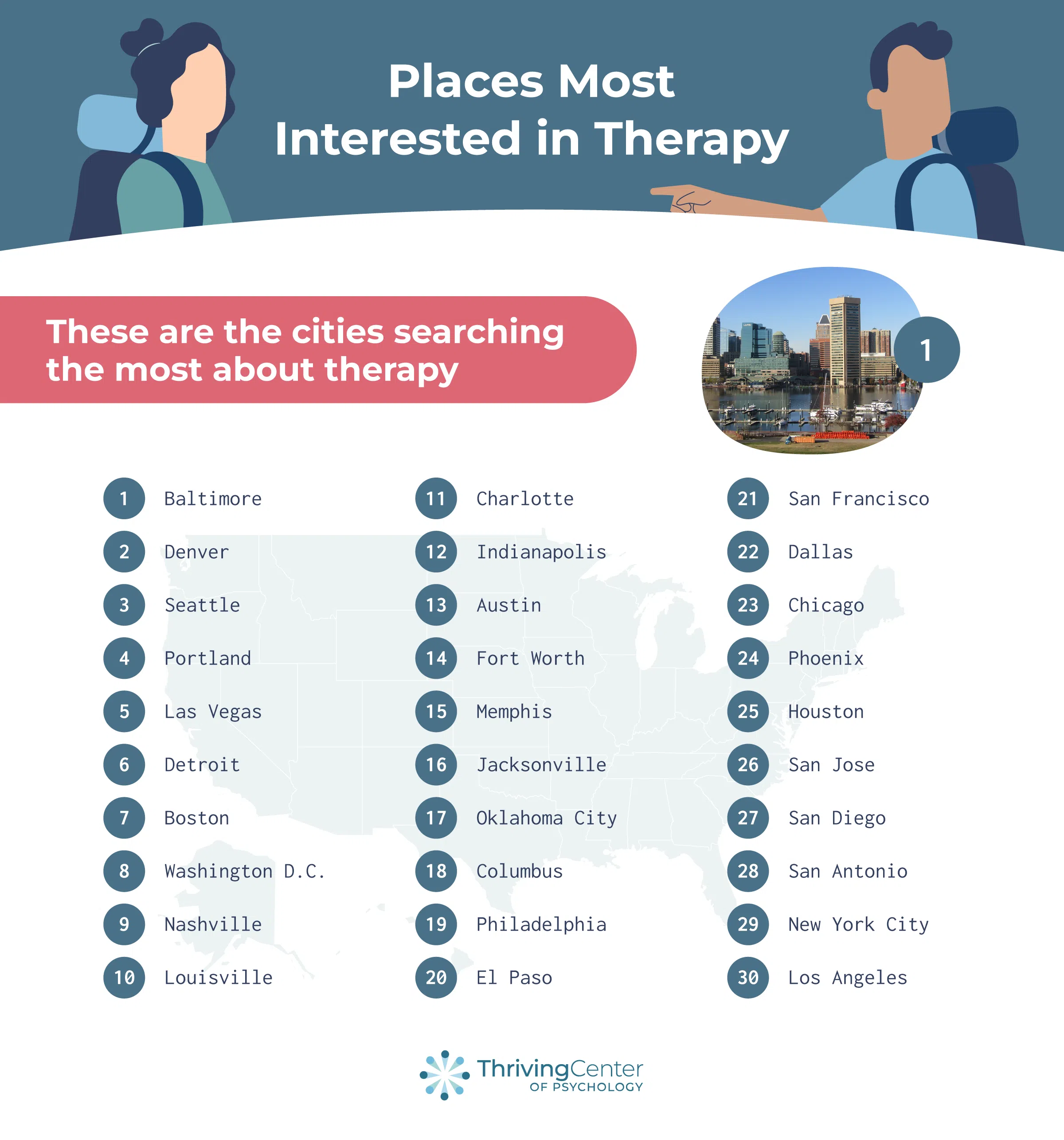
It’s been a hard few years. Across the United States, many are turning to Google to help them with their mental health. Searches for “therapists near me” increased 49% from 2020 to 2023!
We examined the searches of the 30 most populous cities in the United States to determine the cities most interested in therapy across the nation. The city searching the most for words like “how to find the right therapist” and “counseling near me” is Baltimore. Rounding out the top three cities most interested in therapy is Denver (2nd) followed by Seattle (3rd) in Washington. Not far from Seattle is Portland, which ranked 4th.
Why is it so Hard to Find a Therapist?
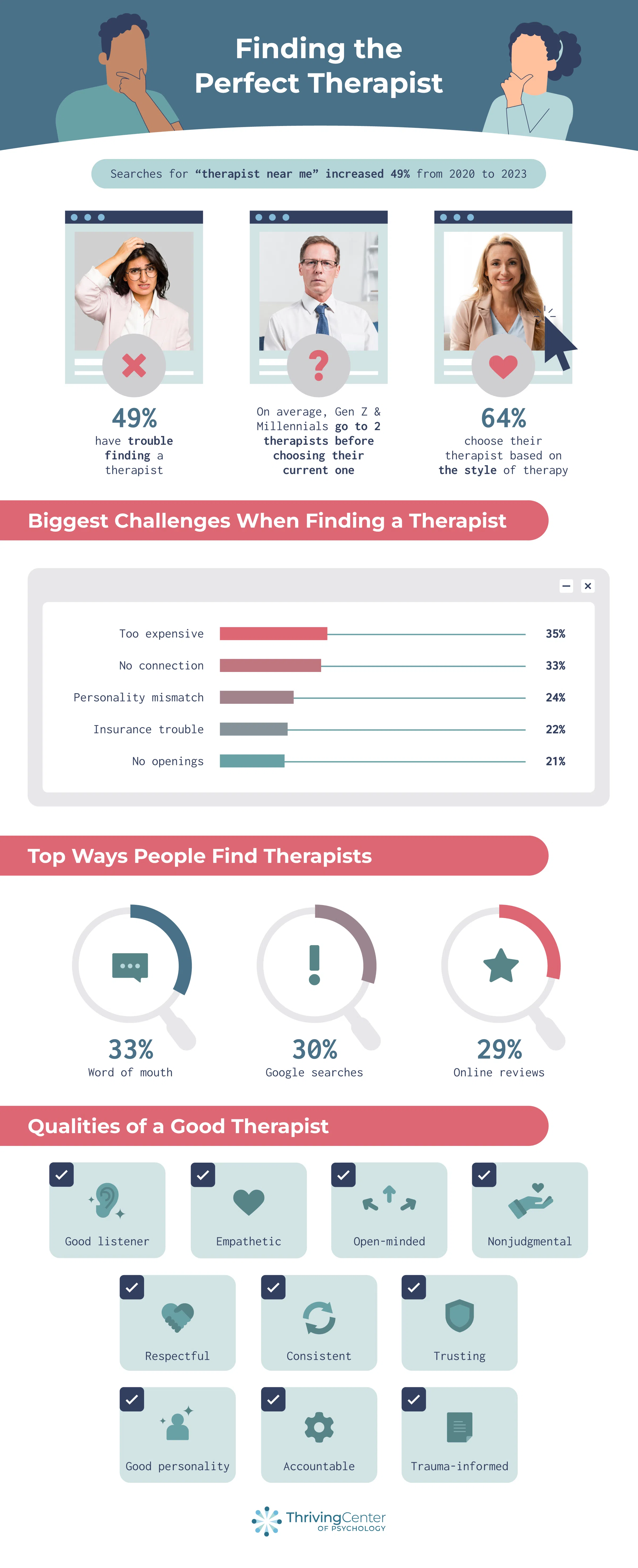
Nearly half (49%) of Gen Z and Millennials have had trouble finding a therapist. The biggest challenge they face while searching for a therapist is finding an affordable one. More than 1 in 3 (35%) said the therapists they tried were too expensive.
Others have trouble making a connection or finding a personality that fits with theirs. According to Gen Z and Millennials, the best qualities of a therapist include being a good listener, empathetic, open-minded, and nonjudgmental.
Some are looking for very specific qualities when it comes to their therapist. More than half (51%) want a specific gender, more women than men have this preference. About 1 in 6 choose their therapist based on their age and race. Nearly 2 in 3 (64%) go with a therapist based on the style of therapy they offer such as cognitive behavioral therapy (CBT), Dialectical Behavioral Therapy (DBT), or eye movement desensitization and reprocessing (EMDR).
“At Thriving Center, we wanted to simplify the process of finding the perfect therapist for each individual by offering a tailored matching process,” explains Dr. Alvarado “You can schedule a call with our client coordination team, who will attentively listen to your needs and guide you towards the ideal therapist for your personal journey.”
Many turn to family and friends to find a good therapist, with 1 in 3 relying on word-of-mouth referrals. Another 30% use Google to find mental health help, and others turn to online reviews.
When asked who is best at discussing mental health, 87% of Gen Zers chose themselves, while only 35% of Millennials gave themselves a gold star. The majority of Millennials (59%) feel Gen Zers are the best at discussing mental health. However, both generations agreed that Baby Boomers are the worst at discussing mental health. 81% feel Baby Boomers are the least open when it comes to mental health conversations.
Top 5 Ways to Improve Mental Health in 2024
In 2024, nearly 1 in 5 (18%) are planning to go to therapy to improve their mental health according to survey data. Outside of therapy, the top five things Millennials and Gen Zers are personally doing to improve their mental health are:
- Improving their physical health (better sleep, regular workouts, etc.)
- Prioritizing self-care
- Eating healthier
- Devoting more time to hobbies
- Focusing on relationships
Remember, there are always professionals around to help you with your mental health. No one has to do life alone! We hope you have a happy and healthy start to 2024 and the years beyond.
Methodology
In December 2023, we surveyed 1,099 Gen Z and Millennials about their mental health and feedback on therapy. Respondents ranged in age from 18 to 42 with an average age of 29. 50% were Gen Z and 50% were Millennials. 49% were women, 48% were men, 3% were nonbinary. 19% of survey respondents are currently in therapy, 36% have previously gone to therapy, and 45% have never gone to therapy.
To determine the places most interested in therapy, we also analyzed Google search volume of 1,048 searches related to therapy such as “therapists near me,” “how to choose your therapist,” and “where can I get therapy”. We then compared the results to the 30 most populous cities in the United States.
For media inquiries, please contact [email protected].
Fair Use
When using this data and research, please attribute by linking to this study and citing thrivingcenterofpsych.com

How to Move On After a Friendship Breakup
Friendship breakups can sting just as much as a romantic breakup. After all, you’re experiencing a loss of shared history and an understanding of each other that can leave you feeling lonely and isolated. Not all friendships are forever, but moving on from the loss of a friendship does take time and some self-compassion.
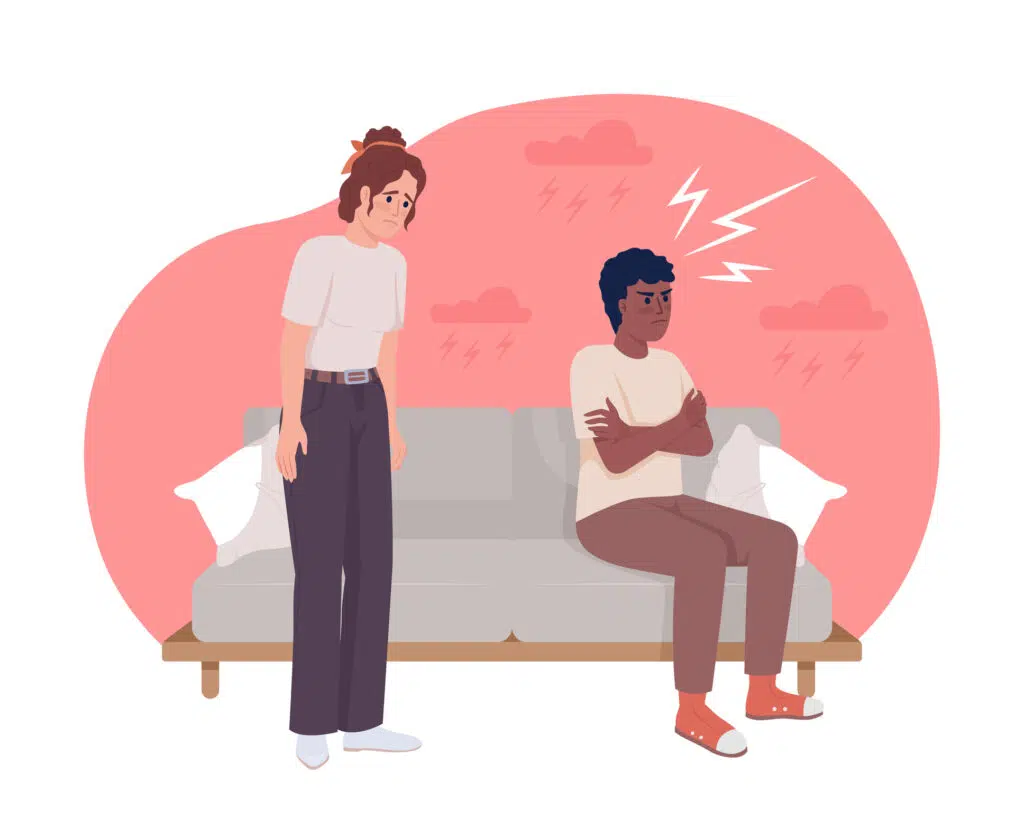
Signs You’re in a Toxic Relationship
A toxic relationship can chip away at your well-being and happiness. Toxic partners can be manipulative and charming, making it difficult to recognize the signs that you’re in a toxic relationship. You deserve to be in a supportive and healthy relationship.

10 Common Marriage Reconciliation Mistakes to Avoid After Infidelity
Infidelity can leave couples devastated. If you’ve been affected by infidelity and want to salvage your relationship, rebuild trust, or make a tough decision, keep reading for 10 common reconciliation mistakes to avoid after infidelity.

Survey: 72% of Americans are Stressing About the Upcoming Presidential Election
Political viewpoints in the U.S. have always been contentious, but is the impact of politics in the United States making it difficult for people to live their everyday lives? With some anticipating another brutal and long campaign season ahead of the upcoming 2024 presidential election, nearly half of Americans say politics is negatively impacting their mental health.




